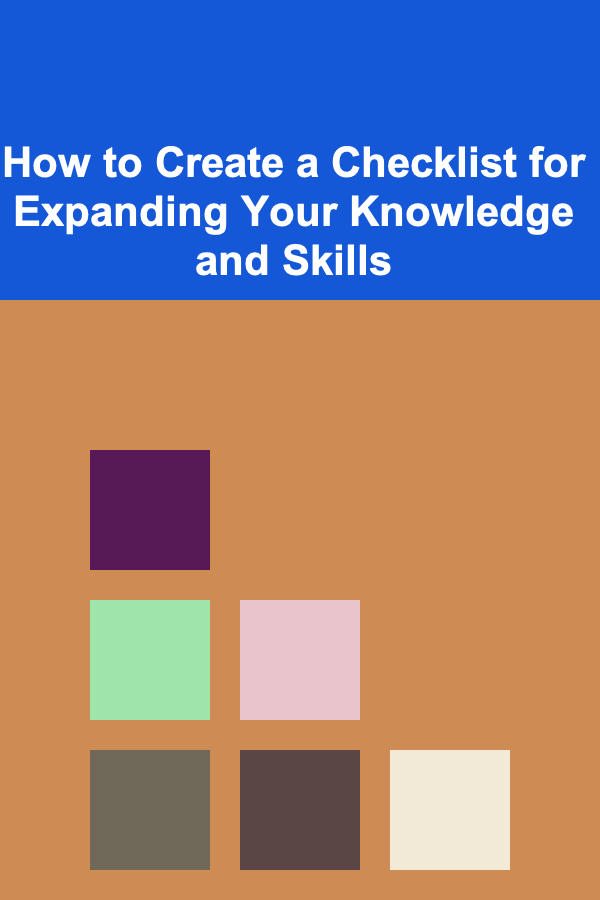
How to Create a Checklist for Expanding Your Knowledge and Skills
ebook include PDF & Audio bundle (Micro Guide)
$12.99$5.99
Limited Time Offer! Order within the next:

In a world that is constantly evolving, the need for continual learning and skill development has never been more important. Whether you're looking to advance in your career, start a new one, or simply broaden your horizons, having a structured approach to expanding your knowledge and skills can make all the difference. This actionable guide will provide you with a comprehensive checklist that you can use to help you stay focused, measure your progress, and achieve your learning goals.
Define Your Learning Goals
Before diving into any kind of learning, it's crucial to have a clear understanding of what you want to achieve. Without a solid goal, it's easy to get lost in the vast sea of information and skills available. Start by asking yourself why you want to expand your knowledge and skills. Are you aiming for career advancement? Do you want to shift industries? Or are you simply exploring a personal interest?
Actionable Steps:
- Set SMART Goals: Define goals that are Specific, Measurable, Achievable, Relevant, and Time-bound. For example, "I want to learn Python programming and build a basic web application within six months."
- Break Down Larger Goals: If your goal is broad (e.g., becoming an expert in digital marketing), break it down into smaller, manageable skills (e.g., SEO, content marketing, social media strategies).
- Assess Your Current Skill Level: Identify where you are in your learning journey. Are you a beginner, intermediate, or advanced in your chosen field? This will help you determine the pace at which you should move forward.
Identify the Areas You Need to Learn
Once your goals are clear, it's time to identify the specific knowledge and skills required to achieve them. Consider all the relevant topics and areas of expertise that will contribute to your overall goal.
Actionable Steps:
- Do a Skill Audit: List the skills and knowledge areas you already possess. Compare these with what you need to learn. This will help you spot gaps.
- Prioritize: Based on your goals, prioritize the skills you need to learn first. Start with the most foundational skills that will give you a solid base for more advanced topics.
- Stay Relevant: Make sure that the skills you are learning align with current industry trends or personal interests. For instance, if you're in the tech industry, learning about AI and machine learning might be highly relevant.
Choose the Right Learning Resources
In today's digital age, there is no shortage of resources for expanding your knowledge. From online courses to books, podcasts, and tutorials, choosing the right learning method is key to ensuring you absorb the information effectively.
Actionable Steps:
- Evaluate Different Learning Platforms: Platforms like Coursera, Udemy, LinkedIn Learning, and edX offer a wide variety of courses in almost every field. Choose a platform that suits your learning style---whether it's video lectures, interactive exercises, or text-based resources.
- Curate Books, Articles, and Journals: Sometimes, traditional reading can provide in-depth knowledge. Research books, industry journals, or high-quality articles that cover your topic comprehensively.
- Leverage Peer Learning and Communities: Join online forums, social media groups, or communities related to your area of interest. Peer learning can help you gain insights and exchange ideas with others who are on a similar learning journey.
- Consider Mentorship or Coaching: If possible, find a mentor who is experienced in the area you want to learn. Their guidance can fast-track your learning process and provide invaluable advice.
Create a Structured Learning Plan
A structured plan ensures that you are consistently progressing toward your learning goals. Without a roadmap, it's easy to get distracted or lose motivation. A plan will help you manage your time effectively, stay organized, and track your progress.
Actionable Steps:
- Set Milestones: Break your learning objectives into smaller, measurable milestones. For example, if your goal is to become proficient in data analysis, you might set milestones such as learning Excel functions, mastering data visualization tools, and completing a project by a certain date.
- Set Timeframes: Allocate time for each skill or topic, and create a timeline that keeps you on track. You can use tools like Google Calendar or project management apps (e.g., Trello, Asana) to schedule specific study sessions.
- Balance Depth and Breadth: While it's tempting to learn everything at once, focus on deepening your understanding of core topics before branching out into more specialized areas. This helps to ensure that you build a strong foundational knowledge.
- Review and Adjust: Every month or quarter, assess your progress and adjust your learning plan if necessary. If certain skills require more time than anticipated, make modifications.
Engage in Active Learning
Passive learning (e.g., reading articles, watching videos) can only take you so far. To truly master new knowledge and skills, you need to engage in active learning. This involves applying the knowledge you've gained in real-world scenarios and testing your skills.
Actionable Steps:
- Practice Regularly: Actively apply what you've learned. For example, if you're learning a new language, practice speaking it every day. If you're learning a programming language, write small programs or contribute to open-source projects.
- Seek Feedback: Get feedback on your work from peers, mentors, or online communities. Constructive feedback is crucial for growth and improvement.
- Teach What You Learn: Teaching others is one of the best ways to reinforce your knowledge. Start a blog, create video tutorials, or offer help to peers to solidify your learning.
- Undertake Projects: Implement projects that force you to use a combination of the skills you've learned. Projects provide context to theoretical knowledge and demonstrate your capabilities to others.
Track Your Progress
To ensure that your learning journey is on track, you need to monitor your progress regularly. Tracking progress will help you identify areas where you need more focus and celebrate the milestones you achieve.
Actionable Steps:
- Use Learning Journals: Keep a journal or log of what you learn each day or week. Documenting your progress can help you reflect on what worked and what needs improvement.
- Measure Skill Development: Use assessments or quizzes to test your knowledge. Many online courses offer quizzes at the end of each module, but you can also find practice exams or self-assessment tools online.
- Celebrate Small Wins: Each time you reach a milestone, celebrate it. Whether it's completing a course, mastering a difficult concept, or finishing a project, acknowledging your achievements will keep you motivated.
- Review Your Goals Regularly: Periodically revisit your initial goals to see if they are still aligned with your objectives. As you grow and acquire new skills, your goals may evolve, and that's perfectly okay.
Stay Consistent and Stay Motivated
Consistency is key to successfully expanding your knowledge and skills. Without a routine or regular practice, it's easy to fall off track. Staying motivated during the ups and downs of your learning journey is also essential to long-term success.
Actionable Steps:
- Create a Learning Routine: Designate specific times each day or week for learning. Consistency is more important than intensity, so even setting aside 30 minutes a day can yield significant results over time.
- Join Learning Challenges: Participating in learning challenges (e.g., NaNoWriMo for writing or 30-day coding challenges) can help you stay motivated and focused.
- Connect with Like-minded Learners: Surround yourself with people who are also committed to learning. This support network will help you stay accountable and motivated.
- Reward Yourself: After completing significant learning milestones, treat yourself to something you enjoy. Rewards provide positive reinforcement and make the learning process more enjoyable.
Conclusion
Creating a checklist for expanding your knowledge and skills is an essential strategy for personal and professional growth. By setting clear goals, identifying key areas of learning, choosing the right resources, staying consistent, and engaging in active learning, you can ensure that you continue to evolve in a rapidly changing world. Remember, learning is a lifelong journey, and by taking a structured, focused approach, you'll be better equipped to achieve your aspirations and realize your full potential.
Reading More From Our Other Websites
- [Simple Life Tip 101] Best Eco‑Friendly Home Hacks for a Zero‑Waste Lifestyle
- [Home Staging 101] How to Stage a Home with Neutral Tones for Broader Appeal
- [Personal Finance Management 101] How to Build a Solid Investment Portfolio for Beginners
- [Needle Felting Tip 101] Pricing Strategies for Handmade Needle-Felted Art: How to Value Your Work
- [Home Party Planning 101] How to Transform Your Backyard into a Summer Party Oasis
- [Organization Tip 101] How to Use Visual Aids for Family Scheduling
- [Personal Care Tips 101] How to Use Soap to Prevent Skin Irritations
- [Personal Finance Management 101] How to Start Real Estate Investing with Little Capital
- [Tie-Dyeing Tip 101] Sustainable Tie‑Dye Techniques: Mastering Earthy Hues with Herbs, Roots, and Fruits
- [Home Budget 101] How to Budget for a Wedding and Still Stay Sane: A Detailed Checklist and Budget Template

How to Design a Functional Entryway for Seasonal Changes
Read More
How to Keep Track of Expiration Dates in Your Emergency Kit
Read More
How to Use DIY Projects to Upgrade Your Home's Interior
Read More
How to Write About Complex Topics Simply
Read More
How To Save Money on Weddings and Events
Read More
How to Customize Your Car First Aid Kit for Road Trips
Read MoreOther Products

How to Design a Functional Entryway for Seasonal Changes
Read More
How to Keep Track of Expiration Dates in Your Emergency Kit
Read More
How to Use DIY Projects to Upgrade Your Home's Interior
Read More
How to Write About Complex Topics Simply
Read More
How To Save Money on Weddings and Events
Read More